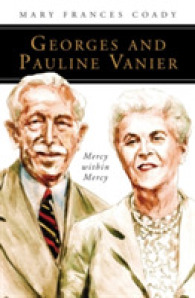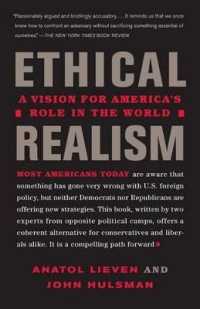- ホーム
- > 電子洋書
Description
Comprehensive and reliable, Blackstone's Handbook for Policing Students 2026 is the ideal companion for the multitude of avenues into policing now open to future police officers, from pre-join degree courses, degree holder entry and degree apprenticeships, to the police constable entry programme. The book will also be of interest to Specials and PCSOs, especially those looking to join the police service as a constable.Divided into five parts, representing key stages in your progression from entry into policing, to initial training and then confirmation, the Handbook leads you through each topic, covering theory, discussion, and practice while helping you to develop your skills of analysis, problem solving, and forms of reasoning. Coupled with a clear structure and accessible style, the book will provide you with the knowledge and understanding necessary to undertake independent patrol in a professional and competent manner. Key topics covered include stop, search, and entry; alcohol and drug offences; sexual offences; interviewing; and intelligence, as well as policing communities and wellbeing. Those aspects of police training which are common to all new entrants are clearly identified. There are specific chapters on evidence-based policing and understanding the Police Constable role, making the Handbook the ideal resource whether you are entering policing through a pre-join scheme or through an alternative qualification route.
Table of Contents
- Part 1: Professional Policing in England and Wales
- 1: Dominic Wood: Introducing the Handbook
- 2: Dominic Wood, Robin Bryant, and Richard Spreckley: Ethical Policing, Professional Judgement, and Decision-making
- 3: Sam Colbear-Pyke and Graham Weaver: Understanding the Police Constable role
- 4: Jennifer Norman and Justin Hobbs: Evidence Based Policing and Problem Solving
- 5: Sofia Graca and Naomi Morrison: The Criminological and Criminal Justice Foundations of Policing
- Part 2: Core Policing Values and Behaviours
- 6: Claire Smith, Barbara Hillier, and Dina Kapardis: Wellbeing and Resilience
- 7: Katja Hallenberg and Helen Sykes: Valuing Diversity and Inclusion
- 8: Scott Clarke and Tara Dickens: Leadership, Communication and Teamwork
- 9: Jessica Bombasero-Brady and Gary Jones: Managing Conflict
- Part 3: Core Aspects of Police Work
- 10: Richard Honess and Steve Russell: Response Policing
- 11: Barry Blackburn and David Knowles: Policing Communities
- 12: Jo Smith and Suzanne Spreckley: Information and Intelligence
- 13: Vince Straine Francis, Paul Norman, and Kevin Lawton Barrett: Conducting Investigations
- 14: Paul Stephens and Paula Bradbury: Digital Policing
- 15: Erika Brady, Kyle Hardcastle, and Garry Dunnagan: Counter Terrorism
- 16: James Nunn and Adrian Walder: Policing the Roads
- Part 4: Vulnerability and Policing
- 17: Tara Dickens and Katarina Mozova: Public Protection
- 18: Paula Bradbury, Jack Moss, and Susanne Knabe-Nichol: Victims and Witnesses
- 19: Paula Bradbury and Elena Martellozzo: Vulnerability and Risk
- 20: Barry Blackburn and Giuseppe Serrantino: Alcohol, Drugs, and Substance Use
- 21: Paula Bradbury and Kristina Massey: Sexual Offences
- 22: Katarina Mozova and Jo Mockeridge: Gangs and Serious Youth Offending
- Part 5: Other Aspects of Police Work
- 23: Jack Moss, Stewart Frost, and Vince Leonard: Unlawful Violence and Damage Against Persons and Property
- 24: Jack Moss and Stewart Frost: Theft, Fraud, and Related Offences
- 25: Dominic Wood, Robin Bryant, and Richard Spreckley: Stop and Search
- 26: Sam Colbear-Pyke and Graham Weaver: Protest, Disorder, and Anti-Social Behaviour







